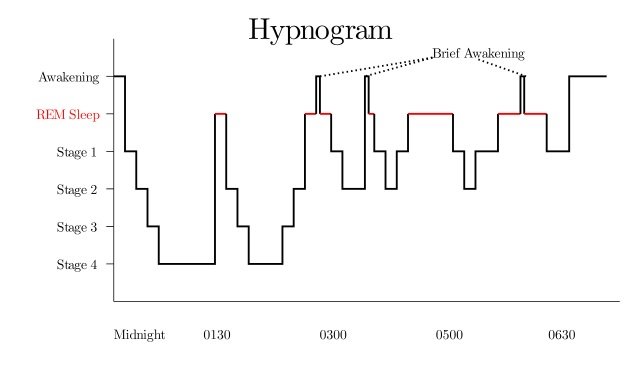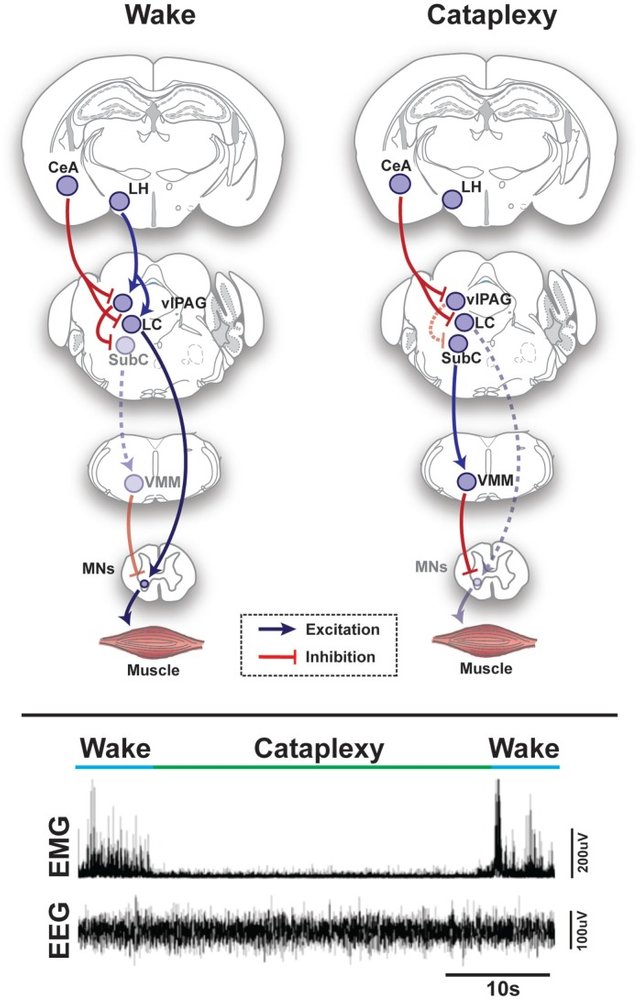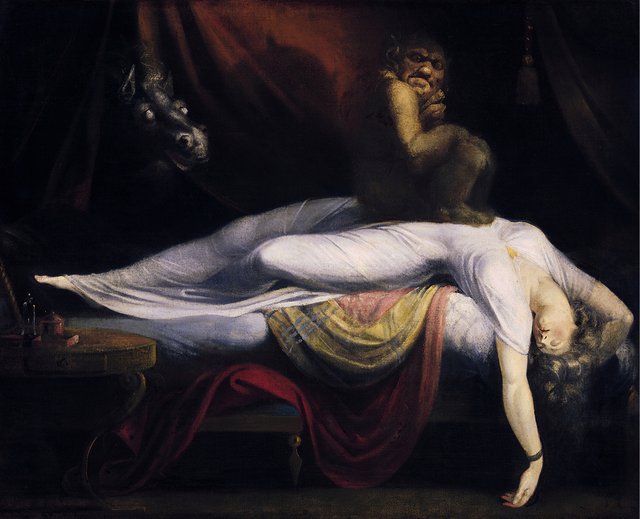Exploring Sleep Paralysis

There was a period in my teenage years when I was plagued with various non-incapacitating ailments; I suffered from frequent colds (sometimes the flu), I suffered from a mild form of rheumatism which required injections with antibiotics, I suffered from indigestion (this is serious; I'll probably discuss it at length in a future post) and I also had various sleep disorders. One of such disorders I can so vividly recall is sleep paralysis.
I remember waking up in the morning and not being able to move. I was conscious (aware), sometimes I would be able to open my eyes, I would hear noise from the room, but I was basically paralyzed. Something was pulling me back to sleep. I would fight the urge and try to move to remain awake and to recover my senses. Sometimes I would be successful, but most of the time I would fall back to sleep and wake up normally at a later time (minutes to an hour later).
I never actually took the time to digest these experiences properly. There are many things from my past that I will discuss here. This helps me reprocess such experiences and filter them through my current understanding of the world.
In this post I will discuss sleep paralysis. My approach is science oriented as I'm going to discuss the findings of a couple of research articles on this issue. I'll also discuss the cultural and folkloric connotations people usually attribute to this physiologic disturbance.
Sleep Paralysis - What is and What is Not
Described by Sharpless and Grom in a 2014 article:
"Sleep paralysis (SP) is a period of time upon sleep onset or offset when voluntary muscle movement is inhibited, yet ocular movements remain intact."
V.S. Ramachandran, a researcher I highly esteem, and B. Jalal (2014) report that under sleep paralysis the sleeper experiences a transitory period of gross motor paralysis while respiration and eye movements are full functioning. This is very similar to my experience.
Sleep paralysis can be isolated - not accompanied by other sleep disorders - or nonisolated. Isolated sleep paralysis can be recurrent - happening with a higher frequency.
You might think this is uncommon, but sleep paralysis occurs in roughly 6.2% of the general population - being similarly prevalent in both women and men.
As reported in A Clinician's Guide to Recurrent Isolated Sleep Paralysis:
"Sleep paralysis (SP) occurs when rapid eye movement (REM)-based atonia perseverates into wakefulness. Most individuals with SP also experience dream activity during the conscious paralysis that is vivid, multisensorial, and often negatively valenced. The combination of atonia and waking nightmares makes SP a very unpleasant experience for most people and the one that may not be easily understood.
Patients may instead use other nonmedical explanations to make sense of it. Perhaps not surprisingly, SP has been thought to have a role in the genesis and/or maintenance of many supernatural beliefs (eg, nocturnal alien abductions and demonic attacks) in individuals with otherwise intact reality testing."
More on that in a moment.
To get a clear view of the pathophysiology of narcolepsy, sleep paralysis, cataplexy, and REM sleep based disorders (RBD) researchers need to explore the neural circuitry in REM sleep and REM sleep paralysis.
In a 2015 paper titled REM Sleep at its Core – Circuits, Neurotransmitters, and Pathophysiology, Fraigne and colleagues remark:
"Disturbances in the normal control of REM sleep underlie cataplexy/narcolepsy and RBD, which are two common and serious sleep disorders. Narcoleptics not only experience pronounced sleep disturbances, but they also experience cataplexy – the sudden unwanted loss of muscle tone during otherwise normal wakefulness. Cataplexy is hypothesized to result from intrusion of REM sleep paralysis into wakefulness."
A normal 11 to 6:30 night sleep hypnogram (sleep EEG) is depicted at the beginning of the article. Below you see the pathways that regulate muscle activity in normal wakefullness and cataplexy in a mouse brain.

The dysfunctional activation of REM sleep paralysis in wakefulness (or upon waking) is considered to produce cataplexy.
Hypotheses for the occurrence of sleep paralysis:
- disrupted REM sleep
- on the basis of sleep deprivation
- as an associated condition with narcolepsy and obstructive sleep apea
- problems with the regulation of melatonin
- as a result of sleeping in a fixed supine position
- dysfunctional overlap between REM sleep and the waking stage of sleep
- due to genetic factors (as reported in a case study of monozygotic twins)
What is being speculated in the Culture and Folklore
As pointed out by Jalal and Ramachandran (2014), in sleep paralysis, the body image of the sleeper may get distorted:
"During the episode it is common to undergo out-of-body-experiences, autoscopy, and even wrenching of the 'person' from his or her body. Visual hallucinations of swirling arms, legs, and feet - and pain and spasms in hallucinated limbs- may be experienced as well."

In another study conducted by Jalal and colleagues in 2015, researchers purposed to explore cultural explanations of sleep paralysis in Italy. They recruited 68 participants from the region of Abruzzo. As explained in the study:
"All participants had experienced at least one lifetime episode of SP. The sleep paralysis experiences and phenomenology questionnaire were orally administered to participants. We found a multilayered cultural interpretation of SP, namely the Pandafeche attack, associated with various supernatural beliefs. Thirty-eight percent of participants believed that this supernatural being, the Pandafeche—often referred to as an evil witch, sometimes as a ghost-like spirit or a terrifying humanoid cat—might have caused their SP."
Going through this myself, I am inclined to think that it's very easy to confabulate and to try to assign out-of-the-ordinary meaning to such intense physiological and psychological experiences. This may be more prevalent if the person in cause does not have a good grasp of science, comes from a poor education background, and puts a lot of importance on cultural and folkloric beliefs.
Management and Prevention of Sleep Paralysis
- improving/keeping a regular sleep schedule (easier said than done)
- reducing the intake of stimulants (or restricting it to the first half of the day)
- reducing stress (this is so non-specific!!!)
- serious cases of SP may require the use of SSRIs and antidepressants
- sleeping on the side instead of on the back
Anecdotally, as reported in Sharpless and Grom 2014 study:
"The majority of the sample attempted to disrupt episodes as they occurred. Although the utility of these techniques was mixed, attempting to move extremities (trying to calm down) had relatively higher rates of success."
This is what I was telling you in the beginning. I would often try to move my fingers or toes during an episode in an effort to regain full movement-control (I was already aware - conscious); sometimes I would be successful.
Ending Thoughts
Whether or not people assign supernatural explanations to sleep paralysis (I know I did), this physiologic phenomenon is real. Understanding its neuro-biologic basis is of tremendous importance for better management, prevention and even cure in the case of recurrent isolated sleep paralysis.
I am personally confident that through science and research we will eventually elucidate all underlying mechanisms behind this disorder of sleep. Once that happens, people suffering from it will be more liberal in recognizing and sharing their experiences, thus increasing their chances to eliminate this disturbance from their lives.
Disclaimer:
Please do not take this as medical advice. I am not a doctor and I don't play one on the Internet either. Any actions you decide to take, do it at your risk and do it under supervision.
To stay in touch, follow @cristi
Credits for Images: RazerM CC-BY-SA-3.0 via Wikimedia Commons, Fraigne, Torontali, Snow and Peever 2015 CC BY and Henry Fuseli via Wikimedia Commons.
Cristi Vlad, Self-Experimenter and Author
Ive had just about every kind of sleep paralysis teens through mid twenties. I remember when I was trying to find out what was happening I found that picture you have up there and thought the Incubus was coming after me which is kinda cool :)
Later I worked at the Stanford Sleep Epidemiology Research Center interviewing research subjects and learned about sleep paralysis. Great article!
You should write up those experiences (anonymized, of course). I'd love to hear about them.
Ill contact Secret Writer lol
how is that possible?
How is what possible?
9 hours later I'm still counting sheep paralysis

baaaaaaaaaaaaaaaaaa
I absolutely been intrigued by the concept of Lucid dreaming and Astral projection where Sleep paralysis sometimes performs major role.. Awesome article..
astral what? lol :)
Astral Projection.. It's a really cool this..
Here's Wiki about it.. https://en.wikipedia.org/wiki/Astral_projection
If you have seen The conjuring, they've portrayed astral projection in it.. :D
I've never had sleep paralysis but in my youth I had night terrors. Interestingly enough, I never knew I had them but I would wake the entire house with my blood-curdling screams. I often wonder if it is inherited because one of my sons also had night terrors, and so did my father. Brain studies are so fascinating because there is so much we simply do not know.
I can't imagine how frightening it would be to wake up and not have the ability to move. Instead of sleeping, I might have laid there wide awake in a panic!
It's the scariest feeling ever. I get night terrors to and I'd rather have one than sleep paralysis. It's close though they are both terrifying.
yes, but if you know the underlying mechanisms, you might actually be able to live with it..
We're so used to the waking/sleeping transition happening smoothly that we don't recognize how many different parts of the brain have to be perfectly coordinated to pull it off.
I was surprised to see half a million YouTube results for "sleep paralysis" just now. I was looking for a documentary I saw a few months ago, which I couldn't find again. It implied that because so many people report similar imagery (red-eyed shadow people led by a shadow in a hat) during sleep paralysis, said images must be real. They were not taking into account all the external, cultural ways that we have of synchronizing our dream lives (like reading and commenting on half a million YouTube videos, for instance). @mada is writing a series on this kind of stuff.
thanks for pointing that out. I didnt actually look on youtube yet but I'll do that now :)
Fantastic Post. Sleep paralysis is terrifying when it happens. I know from personal experience.
BTW how do you add the lines to divide the separate parts of your post?
copy paste this: "___"
for more markdown language usage, see this simplified tutorial: here
Thanks:)
I've experienced sleep paralysis on several occasions, but nothing can come close to how terrifying it was the first time when I didn't know what was happening. I thought I was being attacked by some kind of invisible aliens wielding some futuristic weapon that prevented me from moving. It happened around 3 am on a night where I was tossing and turning, falling in and out of sleep. I didn't go back to sleep after that.
Once I realized what actually happened though, and what to do if it ever happened again, I handled it much better when it did eventually happen again. Great post @cristi!
I can relate to that!
I have been very interested in this topic for quite some time now. I thoroughly enjoyed reading it! :)
how is that? can you please describe?
I would have lucid dreams with sleep paralysis. It was horrible and SSRI'S made it worse! Sometimes I would stop breathing to. Come to find out, it doesn't happen near as much when i'm not shoving heroin into my arms anymore. In my case the SSRI's were not a good decision. Can't blame the doc though. I told him I was clean and still getting paralysis. Now that I dont do drugs, it's rare.
so in your case do you think it was the drugs or the combination of drugs and SSRIs?
Well I was on street drugs then went to rehab where they immediately gave me suboxone and SSRI's. Then the paralysis got worse, they took me off the SSRI's but left me on suboxone and it got better. So I'm not sure but it could have been the SSRI's combined with the suboxone but I've never been on SSRI's alone. I'm a year clean, and no longer on suboxone and it's only happened once in the past three months. I'm happy with that number.
In my only episode of something like sleep paralysis, it was Elvis -- white jumpsuited Elvis -- with his black hair all tendrilled out reaching for me.
On the other hand, I very commonly have dreams where I can't get away from something, which is sort of the opposite, where wakefulness is intruding into a dream just enough for me to realize that I can't move, but not enough to disrupt the dream narrative.
that sounds more like a lucid dream.